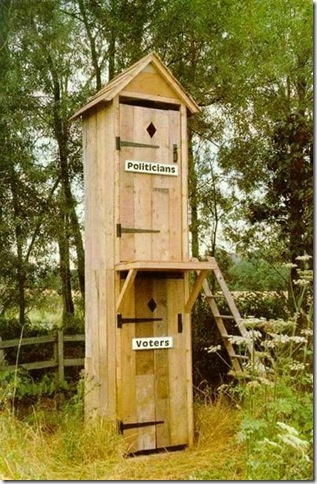 Discussion of Shane Jones's proposed amendment to the Building Act to remove some hurdles for producers of sub-standard boxes [story here; video here] seems to have omitted more than a couple of important points.
Discussion of Shane Jones's proposed amendment to the Building Act to remove some hurdles for producers of sub-standard boxes [story here; video here] seems to have omitted more than a couple of important points.
The first thing to note is that it's only a pimple on the bottom of a very expensive problem: one created almost wholly by over-regulation.
The second is the issue of councils, and the power they have over designers and would-be home-builders. Now for various reasons, councils themselves are up in arms at Jones's proposal, but it has to be asked why councils should be involved at all in the job of inspecting and approving new houses? Why should they? Why on earth should productive people have to go cap in hand to the unproductive in order to seek permission to produce?
It's not only dead wrong, but there's no incentive under any building legislation either mooted or extant for councils to deal with the consent process in a timely manner (and they mostly don't) or with the inspection process in a rational manner (and it generally isn't); under the present legislation councils are keeping builder's and home-owners waiting often for months while they determine whether or not permission will be granted to go ahead, and when or if permission is granted, and building finally commences, the irrationality of much of what builders face from the inspections imposed on them would try the patience of Job.
The level of frustration most people feel on the productive side of building -- that is, those who build houses -- might be measured by the number of people on the other side of the fence -- that is, those whose only job is to get in their way. At present there seems almost more people on the dark side getting in the way than there are actually building houses. As can be seen from a perusal of the 'situations vacant' sections of most trade journals, the only thing keeping the number on the dark side down is the paucity of applicants to fill all the positions created by a nannying bureaucracy and by too overbearing building legislation.
If councils could increase the numbers on the dark side, they would. But it needs to be asked again, why are councils involved at all?
There's no particular expertise that councils' harbour that can't be found elsewhere, and no reason at all that the market for houses be treated in any way that's substantially different to the market for anything else. You don't ask council inspectors to examine your car or your boat before you buy it; there's no more reason to ask them to look under your bonnet before you buy than to look under your house while you build.
There's no reason that the insurance market can't do the job that's essentially being asked of councils, one that insurers have demonstrated beyond any doubt they're capable of, while all this time councils have demonstrated just the opposite. Insurers can look after housing in a similar way to how insurance operates with cars: If we choose to build the housing equivalent of a Toyota Corolla, then premiums would be low and inspections straightforward -- inspections based on a previously agreed standard laid down by the insurer, and carried out in the timely fashion we've come to expect when we ding our cars. If we want to build something a bit different, then both the standard used and the premium levied would be different, just as it would be if we chose to build a hot rod. All good common sense.
 And if we want to build the housing equivalent of a Trabant, which is what Shane Jones seems to think we should all do, then we might expect to be discouraged by our insurer rather than encouraged.
And if we want to build the housing equivalent of a Trabant, which is what Shane Jones seems to think we should all do, then we might expect to be discouraged by our insurer rather than encouraged.
The motivation to deal with an insurer is the same as it is when we insure our cars -- to protect our investment -- and also, in the case of houses, to ensure that future buyers are comfortable with the standard of our house. (They might, for example, be looking for the seal of their favourite insurer before being comfortable enough to buy, and if we want to make a sale, we're obliged to meet the buyers standard or else watch them go elsewhere.)
The difference to how things are presently done should be obvious, and the motivations to improve standards and reward innovation clear enough. Under an insurance-based system, both builders and insurers would be keen to protect their standards and to lower their premiums -- and they'd both be highly motivated to see the speed of processing and construction improve, and to reduce their costs by continual and ongoing innovation.
This is not what happens now.
It's usually maintained that government needs to maintain building controls and local governments inspect local buildings in order to maintain standards. The proposal to build Trabants as the only way to get anything out of the present system should demonstrate fairly well that we're at the dead end of a dead system. If this is 'innovation,' then who needs it?
What sort of 'standard' is being laid down by removing the hurdles from building cheap prefabricated boxes, but retaining them (or even having them increase) for any house of any greater quality that tries to get a flower instead of a weed out of the system? By insisting on building weeds we're doing what architect Claude Megson called "building the slums of tomorrow" -- we're ensuring that the overall standard of the country's housing stock is rapidly and progressively diminished, and innovation progressively and permanently discouraged.
And not just discouraged, but effectively prohibited. As Frank Lloyd Wright pointed out,
The building codes of the democracies embody, of course, only what the previous generation knew or thought about building...
That's true. There are two main legislative burdens imposed on every home-builder, designer and would-be home-owner: the Resource Management Act imposes the nostrum of "sustainability," insisting that "future generations" somehow be taken care of, while the Building Act with all its myriad controls insists that the remedies and methods of previous generations be rigidly adhered to.
Either way, the present generation gets it in the wallet.
Both impositions are insane -- the former tying us to a generation that never arrives, and the latter to a generation whose innovations we are not allowed to supersede -- and between them they ensure that the prosperity and wellbeing of this generation of potential home-owners is sacrificed to those of every other, which means in essence to the whims and machinations of housing ministers and housing inspectors.
It's time they were all cut off at the knees.

 Next up is an “ale which looks like a stout” – the very dark Harrington’s Big John Special Reserve (6.5%). It throws a delightful burnt toffee nose. The beer has a depth of well rounded sweet flavours before moving onto a light hop finish. A lot happens in a mouthful. Flash notes that he would not want to overdo this beer but a couple would be good. It certainly warms you up after a cold day’s cricket on Wellington’s windswept sports facilities. It averaged out at 6 out 10.
Next up is an “ale which looks like a stout” – the very dark Harrington’s Big John Special Reserve (6.5%). It throws a delightful burnt toffee nose. The beer has a depth of well rounded sweet flavours before moving onto a light hop finish. A lot happens in a mouthful. Flash notes that he would not want to overdo this beer but a couple would be good. It certainly warms you up after a cold day’s cricket on Wellington’s windswept sports facilities. It averaged out at 6 out 10. Perhaps unfairly, the last beer is Westmalle Tripel (9.5%). Traditionally served in the most beautiful beer glasses in the world, this straw coloured Trappist ale is a genuine world classic. Lurking under a pillowed head of foam is, in
Perhaps unfairly, the last beer is Westmalle Tripel (9.5%). Traditionally served in the most beautiful beer glasses in the world, this straw coloured Trappist ale is a genuine world classic. Lurking under a pillowed head of foam is, in 












